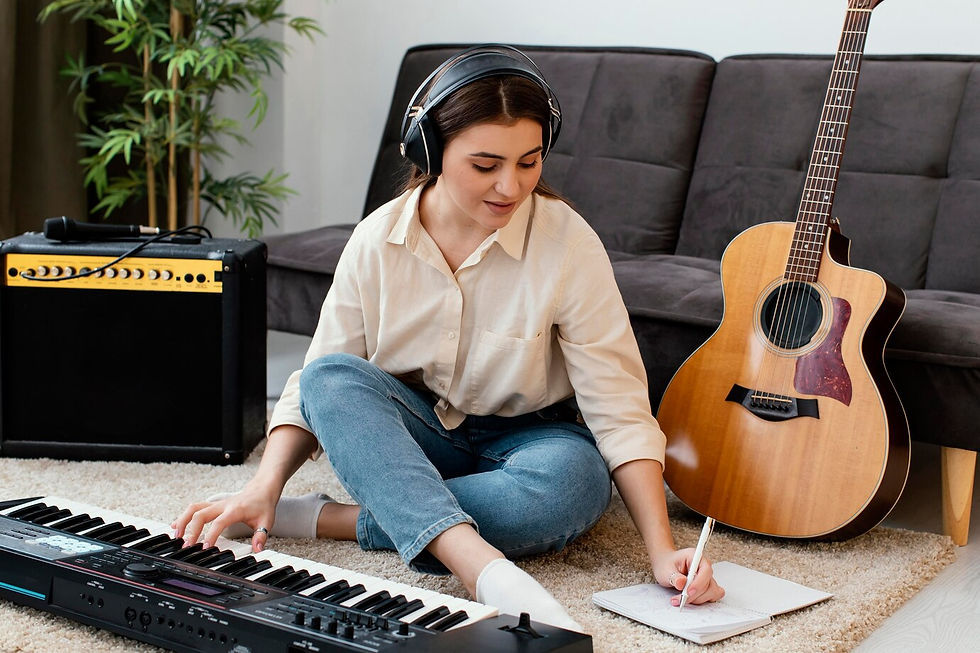Music Lessons: A Fun and Rewarding Path to Mastering an Instrument
- NYC Piano Doctor

- Oct 14, 2024
- 3 min read
Learning to play an instrument is one of the most rewarding and enjoyable experiences a person can have. Whether you’re picking up an instrument for the first time or returning to lessons after a break, music lessons offer a structured way to grow your skills while enjoying the process. The journey may have its challenges, but it’s a fun and fulfilling path that brings lifelong benefits.

1. The Joy of Learning at Any Age
One of the greatest things about music lessons is that anyone can benefit from them, regardless of age or background. While many people assume that music is best learned in childhood, that’s not always the case. Adults can pick up an instrument and master it just as well as younger learners. In fact, learning music as an adult can offer a fresh sense of accomplishment and even act as a stress reliever.
For children, however, music lessons offer some additional benefits. Aside from learning how to play an instrument, children gain skills like patience, discipline, and creative thinking. Music lessons for children can also boost confidence as they work towards new goals and take pride in their progress.
2. The Learning Process: Starting with the Basics
When beginning music lessons, you’ll start with the basics, no matter your skill level. These include learning how to read music, understanding rhythm, and mastering proper techniques. While this part of the process may seem slow or even a little frustrating, it lays the groundwork for everything else.
A good teacher will help you break things down into manageable steps. They’ll guide you through the basics and teach you the importance of regular practice, offering encouragement along the way. The early stages might focus on short, simple songs to help you get comfortable with the instrument, giving you a sense of accomplishment that will motivate you to keep going.
3. The Importance of Regular Practice
If there’s one thing that every musician agrees on, it’s the importance of regular practice. Just like learning a new language or developing any skill, consistency is key when it comes to mastering an instrument. That doesn’t mean you need to spend hours each day practicing, but setting aside even 15-30 minutes daily can make a huge difference.
For children, parents can help make practice time more enjoyable by keeping it fun and rewarding. Instead of seeing practice as a chore, encourage your child to think of it as their time to explore and be creative. With the right mindset, practicing music becomes less of a task and more of an exciting challenge.
4. The Role of the Teacher
Finding the right teacher is crucial to your success in music lessons. A good teacher doesn’t just guide you through techniques and exercises—they also make learning enjoyable. The right teacher will listen to your goals, adapt lessons to your learning style, and keep you motivated.
Teachers can also provide insight into different styles of music, allowing you to explore genres and techniques you might not have considered before. Whether you’re interested in classical, jazz, rock, or even electronic music, a skilled teacher will help you navigate the world of music in a way that’s engaging and inspiring.
5. Progress and Milestones

As you continue with your music lessons, you’ll notice gradual progress over time. One of the most rewarding aspects of learning an instrument is the feeling of mastering a piece that once seemed impossible. From playing your first song to performing in front of others, the milestones along the way will give you a sense of accomplishment.
Don’t be discouraged if progress seems slow at times—everyone learns at their own pace. With patience and regular practice, those small improvements will add up, and before you know it, you’ll be playing more complex pieces and exploring new musical styles.
Conclusion
Music lessons offer a fun and rewarding path to mastering an instrument. Whether you’re a child just starting out or an adult looking to pick up a new hobby, music lessons provide the tools and structure needed for long-term growth. With the guidance of a supportive teacher and regular practice, you’ll not only improve your skills but also gain a deep appreciation for music. The journey might be challenging at times, but the rewards—both personal and musical—are well worth it.


Comments